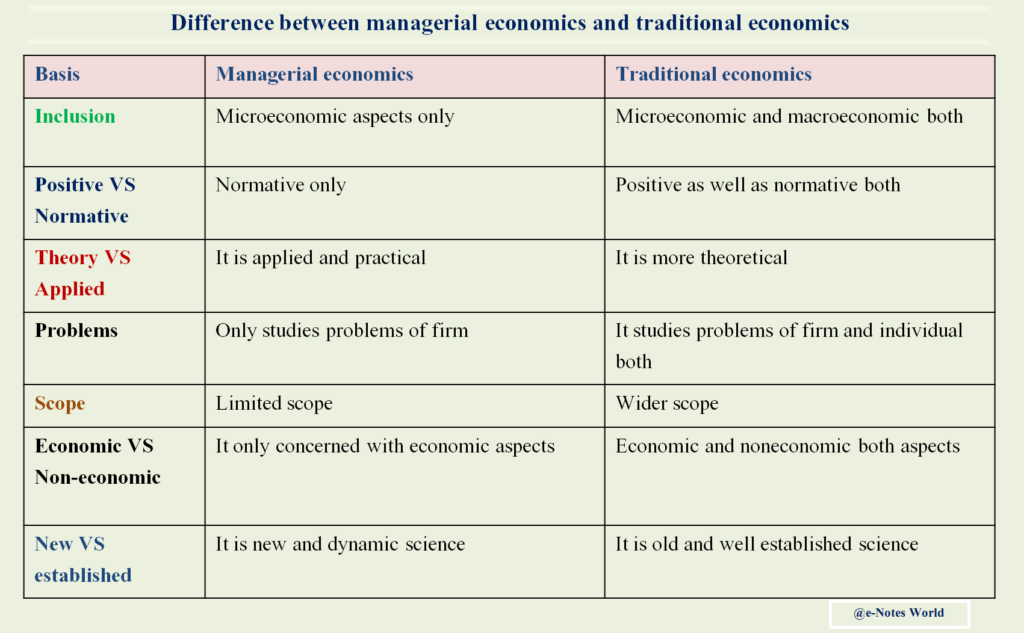Managerial economics is developed from microeconomic theories by taking those concepts and techniques that help managers to select strategic decisions/direction, efficiently allocate the available resources, and to respond effectively to strategic issues. Therefore, it is an application of economic theory into business practice/management. Managerial economics uses micro and macroeconomics, their concepts, theory, and techniques but they are mostly guided by microeconomics. It uses several econometric models also. All the microeconomic and macroeconomic concepts are of traditional economics. So there is a relationship between managerial and traditional economics.
The concepts used by managerial economics such as marginal cost, marginal revenue, the elasticity of demand are microeconomic concepts and national income, money, investment, consumption, international trade, etc. are macroeconomic concepts and these all are originally the subject matter of traditional economics.
Therefore, the relationship between managerial economics with traditional economics is like that of engineering with physics and medicine with biology. The relationship between managerial and traditional economics can be seen as interdependence and differences between them.
Contents
Interdependence between traditional and managerial economics
The interdependence between managerial and traditional economics can be seen in the following titles;
In the field of production
There is a close relationship between managerial economics and traditional economics in the field of production. There is a need for an efficient allocation of resources to get the optimal level of production by scarifying the minimum amount of input resources.
For such the business managers should know economies of scale, the law of diminishing return, the optimal combination of inputs, etc. and these are the matters of traditional economics.
In the field of sales promotion
Demand for any commodity depends upon many factors like the income of the consumer, size of the population and its composition, advertisement, the elasticity of demand, consumer’s expectations, etc.
These all are studied under traditional economics. But to promote the sales volume application is done by managerial economics
In the field of financial decisions
For rational investment decisions, managerial economies have to consider the concept of the time value of money which is the subject matter of traditional economics.
By using concepts of traditional economics, managerial economics analyses the allocation of resources under the situation of uncertainty.
Business forecasting
Based on the trade cycle of the economy, the theory of income & employment, a theory of inflation, etc. managerial economics has to forecast the future of the business which is the most important issue for managerial economics.
Therefore, without the help of traditional economics, business forecasting is not possible.
Decision making
Every decision ma process has various steps and techniques. In such a process, managerial economics uses the concept of traditional economics up to the required extent. In the decision-making process, all the key foundations are always identified by traditional economics.
Therefore, managerial economics is the integration of economic theories with business practices to facilitate decision making and planning by management and which requires continuous and deep nexus between traditional economic analysis and managerial economics.
Traditional economics VS managerial economics
There is deep interdependence between traditional economics (microeconomic theories) and managerial economics for facilitating decision making and planning.
However, there exist some major differences between traditional economics and managerial economics. The major points of difference are as below;

- Traditional economics has both micro and macro aspects but managerial economics has microeconomic aspects only,
- Traditional is both positive and normative science whereas managerial economics is essentially normative,
- Traditional deals mainly with the theoretical aspect only but managerial deals with the practical aspect,
- Traditional analyses economic problems in both micro and macroeconomic view but managerial analyses the economic problems in microeconomic view only,
- Traditional is the study of both firm and individual but managerial economics is the study of problems of firms only,
- Traditional economics has wider scope but managerial economics has a limited scope,
- Under traditional economics microeconomics studies all the theories of factor pricing such as rent, wage, interest, and profit whereas in managerial economics, only the theory of profit management are studied,
- Traditional economics studies only an economic aspect of the problems but managerial studies economic and non-economic aspects of problems,
- Traditional is very old consisting of very well-established laws and theories but managerial is new and developing subject
Therefore there is relationship between managerial and traditional economics as managerial economics is applied microeconomics and microeconomics is originally derived from the traditional economic concepts and well established traditional economic theories.